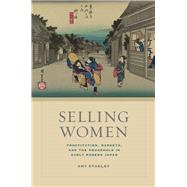- ISBN: 9780520270909 | 0520270908
- Cover: Hardcover
- Copyright: 6/19/2012
This book traces the social history of early modern Japan's sex trade from its beginnings in seventeenth-century cities to its apotheosis in the nineteenth-century countryside. Drawing on a variety of sources, including legal codes, diaries, brothel keepers' records, and the testimony of young Japanese women who worked in the business, it describes how the emergence of a vast market for sexual services shaped the relationship between the household, the state, and the developing market economy. In chapters that move from a booming mining town in Akita to the well-trodden pilgrimage routes of the Inland Sea, it argues that the sex trade's expansion threatened the gendered order that sustained the Tokugawa state. As patriarchal households seemed to fracture amid the tumult of an economic transformation, "selling women" of all varieties - vast numbers of indentured girls sent to brothels far from home, as well as a few older prostitutes who sold sex to support an independent livelihood - were stigmatized as selfish women who destroyed families and communities. By focusing on perceptions of prostitutes' economic (as opposed to sexual) behavior, this study challenges Western theories about how and why women who work in the sex trade are marginalized. At the same time, it offers a new understanding of the relationship between gender and status in early modern Japan, and it suggests how the growing market economy changed the place of women in families, neighborhoods, and the realm at large.






